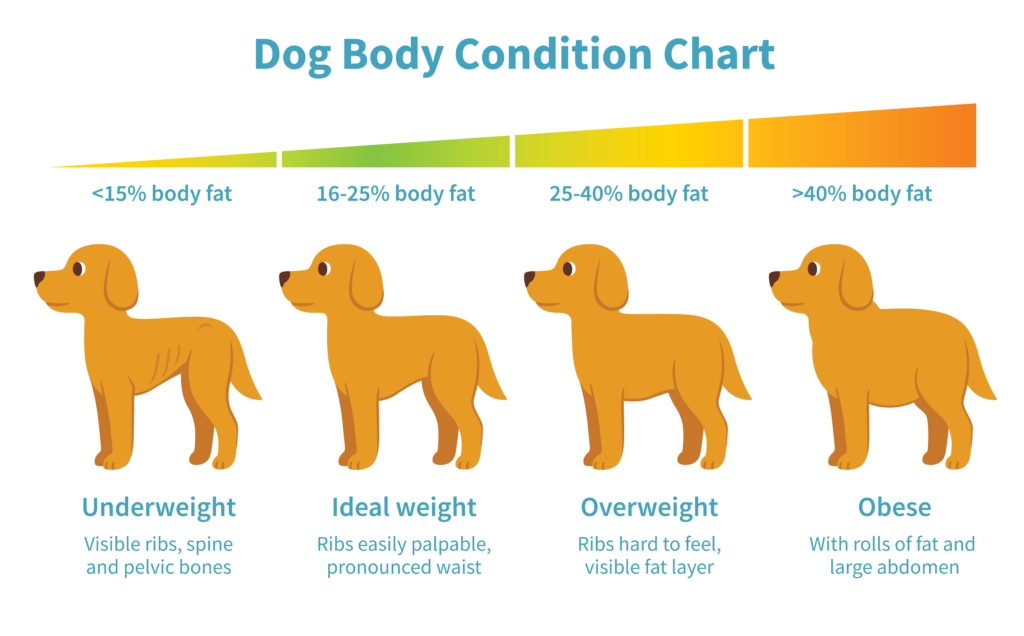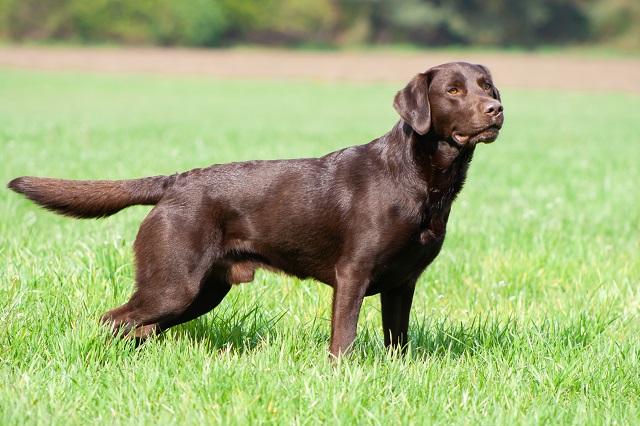Perhaps you would like to find a way to bulk up your Labrador Retriever if you worry about them being too skinny. Treatment of underlying conditions, diet modification, or lifestyle modifications are effective ways to promote muscle development.
Is My Labrador Retriever Too Skinny?
It isn’t much you can do to change an adult dog’s final size in a healthful. When your dog is truly too thin, you can help them gain a bit of weight relatively easily. If your pup is naturally petite, however, you could make it overweight by trying to alter it.
| Ideal Weight for Labrador Retrievers: Generally, male Labradors weigh between 60lb and 80lb, while female Labradors weigh between 55lb and 75lb. Some Labradors do not fall within these averages, however. The whole picture needs to be taken into consideration. |
| Is Being Underweight Always Bad?: It’s helpful to keep in mind that being underweight isn’t always a bad thing. You might have a dog that’s abnormally small for the breed. If both parents of your Lab were quite small, their size would probably be smaller. It might be fine if your dog is proportionately small, although your vet will confirm this. |
| How to Know if My Bulldog is too Skinny: Observing their body type is one of the easiest ways to tell if your Lab is too skinny. From above, examine your Lab. Have you noticed their ribs sticking out? It should still be possible to feel the dog’s ribs despite its size but not see them on its sides. The presence of visible ribs indicates underweight. Has your dog lost a lot of energy as a result? Has your dog not been able to toilet properly? You should address these signs as they indicate that there is a problem. |

What is Making My Labrador Retriever too Skinny?
There is probably a reason why your dog is too skinny. Fortunately, the majority of causes can be treated. Four actions can cause Skinniness, or a medical condition can cause it.
| Not Eating Enough: Not eating enough is the most common cause of underweight dogs. If your pup is not getting enough food, it will not maintain the right weight for its size. There could also be a medical condition or pain preventing your pup from eating properly, even if you provide the right amount of food. |
| Feeding the Wrong Food: You may also be feeding your Lab the wrong food. There are all kinds of problems that can arise if you feed your dog something it is intolerant of. Keeping your dog from gaining weight will be impossible if they cannot process and digest their food. |
| Worms or Other Parasites: The presence of parasites can also lead to weight loss and an inability to put on any weight. If your pet has parasites, your vet should be able to detect them. Examining their stool is the most obvious way to tell if your dog has them. But not every parasite can be seen right away. |
| Other Medical Conditions: Weight loss and being underweight can be caused by other health conditions. Cancer, kidney complications, heart problems, allergies, and even anxiety can all result in weight loss or weight gain for your pup. Your dog may lose weight if it has diabetes because it cannot use glucose as energy. |
When Should I See the Vet about my Labrador Retriever Being Skinny?
You should always go to the vet when you have concerns about your dog’s health. Checking on your dog’s health is in your best interest. You should look out for a couple of signs. You should probably reach out to your veterinarian if you observe these signs.
| Are They Eating Regularly?: Talk to the veterinarian if you notice that your dog’s eating habits have changed or aren’t consuming enough food for their size. When eating habits change suddenly or become irregular, there usually is a problem. |
| Are They Drinking too Much or Not Enough?: In cases where your dog appears to drink constantly or just not enough, there is probably something more serious going on. If unchecked, drinking problems can become quite severe. Insufficient water may suggest diabetes, whereas too much can suggest kidney problems. |
| Are There Toilet Issues?: Does your dog seem to be toileting in an unusual manner? The lack of toileting suggests that the dog is not eating enough. Ingesting too much and having runny stools indicates that their stomachs can’t handle what they’ve eaten. Worms may even be present in the stool. |
| How is Their Energy?: You should get your Labrador checked out if they become listless, tired, and doesn’t move much. When your Lab struggles to maintain its normal daily habits, you should not hesitate to take them to the vet. |
| Are There Any Other Concerns?: Any other concerns, including itching, lumps, pains, wounds, hair loss, or any other strange symptoms, should be addressed by the veterinarian. Whenever you’re unsure about something, it’s worth seeking a professional opinion. |
What Can I Do to Fatten up My Labrador Retriever?
Still want to fatten up your Lab? In this case, you have three primary options: you can help your Labrador gain weight by putting on fat, gaining muscle, or treating the underlying issue that may have caused weight loss in the first place. Your approach will differ in each case. However, both options increase the calories consumed, so either fat or muscle can be developed.
| Building Muscle: Muscle building is done in the same way as in humans. Exercise and a greater caloric intake are needed for your Lab to build muscle. More food means more energy for the dog to put on muscle. Moreover, exercising encourages the dog to build muscles. While exercising to gain weight might seem counterintuitive, it does help. |
| Gaining Fat: It may be necessary to increase the dog’s fat content if it is underweight or too thin. Eating more calories is the easiest way to gain fat. Make sure to choose healthy food and nutritious ingredients. There is no doubt that a raw, whole-food diet would be ideal for all dogs, but this is expensive and time-consuming. If you choose kibble, ensure it contains only real meat as the primary ingredient and avoids fillers. |
| Treat Underlying Conditions: In addition, if you want your dog to gain weight, you must eliminate any underlying causes that prevent weight gain. Putting on weight should be as simple as increasing calorie and food intake. |

Are There Any Things I Should Be Aware of?
You need to consider a few other things before you begin fattening up your dog.
Feeding Your Dog the Right Way
You need to make sure you’re feeding your dog correctly. A normal adult must eat twice daily, in the morning and the evening. A puppy under eight months of age typically eats up to six times per day. To remain healthy, your Lab should consume 25 to 35 calories per pound of body weight daily. The ideal ratio of lean protein to fat in healthy food is 18% lean protein to 5% fat, with the rest being high-quality carbohydrates.
Genetics and Your Labrador Retriever
The genetics of your dog will determine its weight. There is a possibility that your dog is naturally more petite than average or that he is naturally larger than average. It is also possible that your dog might be predisposed to certain medical conditions that may affect its weight. To better understand what your dog might be like, look to the parents or littermates of your dog.
Conclusion
One out of every two dogs is overweight or obese these days, so before you add fat to your dog, make sure it is necessary. Adding weight to your dog in a healthy way is essential if your dog is truly underweight.
Weight changes can be dramatic, even if only a few pounds. After all, a healthy weight contributes to your pup’s happiness and longevity and is worth the effort.

